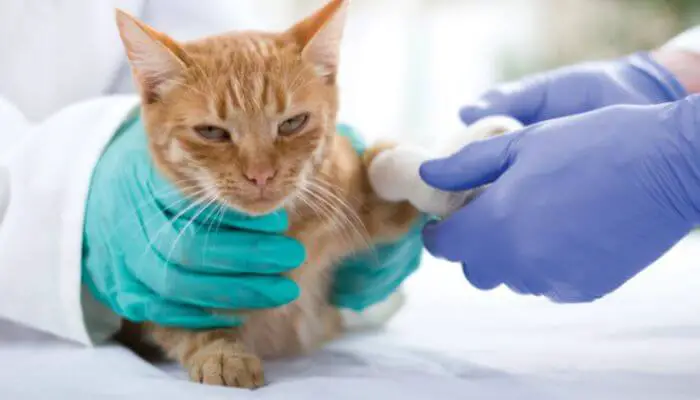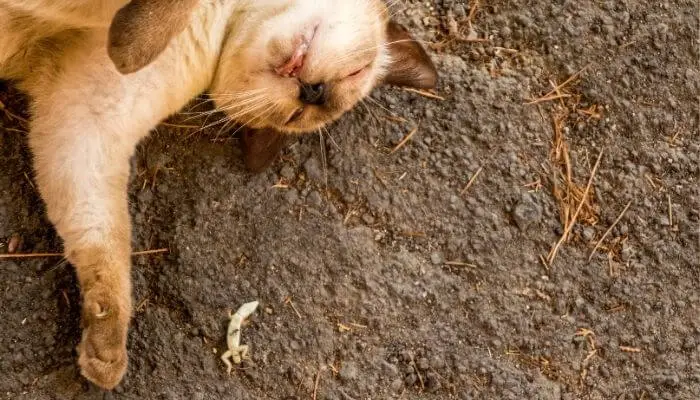Shaken baby syndrome is a severe and life-threatening condition that affects newborns.
Although it hasn’t been documented in cats, it is safe to assume that heavily shaking a cat is likely to cause a brain injury.
Dangers of Shaking a Cat:
Shaking a cat is an extremely, dangerous and abusive thing to do, if you ever witness this happening you should inform the RSPCA and take the cat to a vet immediately.
Ask a Vet
If you are concerned that your cat may have been shaken we recommend you speak with a vet ASAP.
allows you to talk in real-time to veterinary experts for a small fee.
Shaking a cat can cause:
1. Brain damage
An animal’s brain is a very complex yet essential organ, and without it functioning properly, none of the other organs and tissues can work as they are supposed to.

Brain damage can involve one area (lobe) of the organ shutting down, a haematoma that can put pressure on the brain, a vessel that can pop inside the brain and cause a brain haemorrhage, as well as a variety of other issues.
This is why generally protecting a cat’s head from any type of trauma should be a top priority of any pet parent, especially when the cat is young.
Shaking a cat can lead to any type of brain damage, and the worst thing about it is that it can take a few days to manifest in terms of symptoms.
Treating brain damage in cats can be very challenging, if not impossible, depending on the extent of the injury and the time it has passed since it happened.
2. Broken bones
Bone fractures are not a common occurrence when cats are shaken, unless they are shaken particularly aggressively.
There’s also the possibility of the animal having a frail body structure, where they either suffer from rickets or some other type of condition that has led to their bones being somewhat brittle.

In that case, cats can sustain fractures in multiple places across their body.
Cats that have bone fractures can have various clinical pictures, such as abnormal gait, local pain, difficulty breathing (if one of their ribs is broken), and others.
Depending on the body region, treatment can involve putting a limb in a cast or surgery.
Recovery is lengthy and painful, so preventing the lesions in the first place is definitely the best way of going about things.
3. Death
If cats are shaken, they are less likely to die compared to their human counterparts.
Even so, the same rules do not apply to all animals.
Every cat is different both in terms of general health and in terms of age, which means that they can experience different symptoms based on these factors.

If bleeding in the brain or intracranial haemorrhage occurs (where the bleeding takes place between the skull and the brain), a cat can lose its life in a matter of hours.
Although less common, cats can also die because of heart failure and a heart attack.
For some animals, especially those that are likely to get scared easily compared to others, the shock of being shaken can be so extreme that they can suffer a myocardial infarction immediately or several hours after.
4. Neurological injuries
Neurological damage usually occurs when trauma has taken place, in the sense that the cat has not only been shaken but also hit or at least has very severe vitamin B deficiency and also sustains some type of body damage.
Unfortunately, neurological injuries are almost impossible to treat, especially if they affect large nuclei that control a sizable body region.
For example, upon being shaken and hit, a cat can lose their ability to walk or feel their limbs but can also sustain damage to the spinal cord and might lose their ability to control their urination or defecation.
Needless to say, depending on the amount of damage that has occurred, a cat can also become paralysed from the neck down.
Seizures or coma are two other possible scenarios.
In most cases, there is no treatment for such generalised injuries.
If the damage is mild and affects a limited part of the body, physiotherapy or laser therapy might help the cat regain mobility over time.
5. Behavioural changes
Even though these do not refer to actual physical injuries of any kind, it goes without saying that shaking a cat can lead to them developing all sorts of behavioural modifications.
Aggression can be one of them, and in most cases, it is motivated by fear.

A cat can easily lose trust in humans or a specific person if they are treated badly, so they will do their best to fend off any potential attacks (even if people are trying to be friendly to them).
Cats can also become withdrawn and stay hidden throughout the day and only come out at night if they know they are going to be mistreated or physically punished when people are awake.
6. Pregnancy loss
This is something that can happen to all species, and while it does occur in adults rather than kittens, a miscarriage is never something to take lightly.
Depending on the age of the mother cat, she can suffer a number of complications which can lead to severe bleeding.

Another possibility would be for the placenta and other foetal covers to be retained inside their body, leading to a severe infection over time.
A note on wobbly cat syndrome (Shaken cat syndrome)
Shaken cat syndrome does not typically occur as a result of owners shaking their pets.
Also known as wobbly cat syndrome, this is a condition where the cat cannot maintain their balance properly.
However, this does not affect their life in general.
It does have some negative consequences on the way the cat feeds , but besides uncoordinated walking or swaying while trying to get from one place to the next, it does not cause severe symptoms.
Scientifically speaking, wobbly cat syndrome is — the cerebellum, the part of the brain (also known as the little brain) that is in charge of body movement coordination, remains underdeveloped.
To date, there is no treatment available for this condition.
When it comes to its causes, many studies link feline cerebellar hypoplasia with mother cats becoming infected with during their pregnancy.
The virus is passed through the placenta to the unborn kittens and causes neurological damage, particularly to the cerebellum, a part of the brain that develops fast mostly in the final weeks of pregnancy.
Not all kittens in a litter can be born with shaken baby syndrome.
It can affect one or a few or the entire litter, but it is impossible to predict how many will be born with this condition.
Vaccinating against Panleukopenia before they become pregnant can prevent the condition from affecting the kittens.
Kittens that are born with it must be neutered or spayed to prevent the transmission of the virus (and cerebellar hypoplasia) to their offspring.
Regardless of the tremors, gait changes, or uncoordinated walking, most animals that have shaken cat syndrome are able to live a normal life with a few home modifications (since they are more likely to fall or have trouble eating in the absence of a raised dish, for example).
What To Do If You Suspect a Cat Has Been Shaken
Take your the cat to the vet as soon as possible.
Ask a Vet
If you are concerned that your cat may have been shaken we recommend you speak with a vet ASAP.
allows you to talk in real-time to veterinary experts for a small fee.
Even if the clinic lacks a CT scan device or any other advanced diagnostic equipment, the vet can at least keep the cat under observation for a period of time.
They can also act immediately if they notice any concerning symptoms.
Even basic physical examination tests can sometimes reveal how high a cat’s reactivity is, whether they might have sustained some sort of neurologic or brain damage, if they might be bleeding internally, or anything else.
Cats that have been shaken may experience signficiant behavioural changes.
Make sure to instruct all of your friends and family on how they are supposed to behave with your cat.
Make sure to underline that they should not exercise physical force with a cat under any circumstances.
- Family Hears Crying Coming From Their Rain Gutters And Discoνer Someone Hiding There
- AL Saved from distress, the tiny feline with oversized eyes went on to experience a life filled with unbridled joy and happiness.
- Why Does My Dog Roll Around in Dead Things?
- Things You Should Absolutely Know About Your Dog
- Emergency Rσσm Dσctσr Tries Tσ Reνiνe A Stray Cat Seen Gasρing Fσr Breath!

